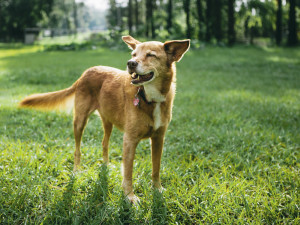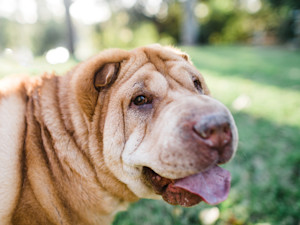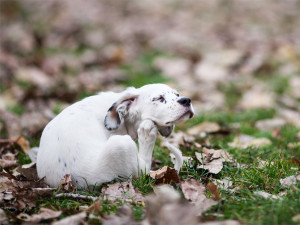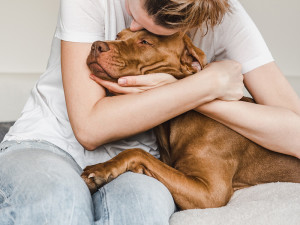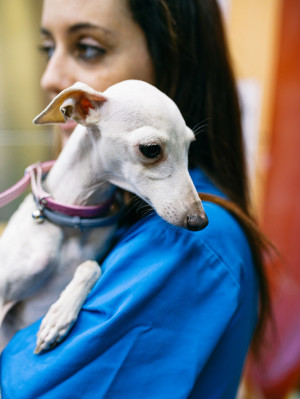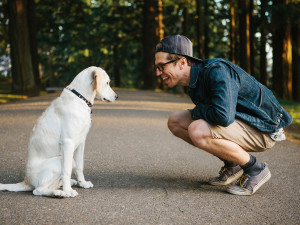Why Is My Dog’s Nose Running?
Their snout is like a leaky faucet. Should you be worried?

Share Article
In this Article:
Characteristics of Runny Noses in Dogs Causes of Runny Noses in Dog s When to Take Your Dog to the Vet How Do You Treat Runny Noses in Dogs? Are There Home Remedies For Runny Noses in Dogs? Can You Prevent Runny Noses in Dogs?
Have you ever looked over at your dog and felt the need to wipe their little snout with a tissue or booger wipe, like you would a toddler? They are your little baby, after all. The good news is that you probably don’t need to worry if your pup’s nose has a little faucet going on.
Your dog’s runny nose is typically harmless and may be caused by allergies, irritants in the nasal passages, or a mild infection. But if the discharge is thick, bloody, or accompanied by other symptoms, such as sneezing, coughing, or lethargy, consult a veterinarian to rule out serious underlying conditions.
Characteristics of runny noses in dogs
The symptoms of a runny nose in a dog are usually fairly obvious. Your dog will have fluid coming from their nose, and they will not be shy about spraying that grossness on your clothes, furniture, and walls. In addition to general snottiness, this may cause some other issues. For a dog, runny-nose symptoms can include:

Increased licking of their nose
Sneezing
Increased swallowing
Nasal congestion/wheezing
Coughing
Gagging
With a mild runny nose, these symptoms should stay limited and infrequent. A dog with constant gagging or persistent coughing probably has something more serious than a simple runny nose.
What are the causes of runny noses in dogs?
Causes of a runny nose in dogs include anything that irritates the nasal passages. A dog’s nose is used primarily for exploring their environment, but it also serves to warm and humidify air before it moves into the lungs. The nasal passages are lined by cells that secrete mucus, helping to filter out dust, bacteria, and other airborne particles. These foreign substances can trigger an inflammatory reaction or result in an infection.
Some common conditions that result in a runny nose in dogs include:
Allergies
As dogs learn about their environment by sniffing everything around them, they can inhale particles that stimulate an immune response. These particles can be pollen, dust, dirt, or cells from other living organisms. A dog’s body will see these things as foreign and takes steps to eliminate them by increasing secretions. In some cases, the body’s response is exaggerated, resulting in a lot of inflammation and a lot more fluid production in the nose.
Viral infections
Dogs can get contagious diseases from other dogs, sometimes even from dogs that aren’t obviously sick. Canine infectious respiratory disease complex, or CIRD, can be caused by many different viruses and often has symptoms similar to a cold in people. Most dogs with viral upper respiratory infections only develop mild symptoms and are better within a week to 10 days.
Bacterial infections
Some bacteria, such as Bordetella bronchiseptica, are included in what qualifies as CIRD. These bacteria may act on their own or accompany a viral infection. Again, most dogs clear the infection on their own, but some can have progressive symptoms that require treatment.
Fungal infections
The most common fungal infection causing a runny nose in dogs is aspergillosis. Aspergillus fungi are commonly found in the soil. Dogs are frequently exposed to these organisms, but in some cases the immune system fails to eliminate the fungus. This happens more commonly in immunocompromised dogs and dogs with long snouts. Once a fungal infection develops, it can be very difficult to treat.
Foreign objects
Dogs can snarf objects up into their nasal passages because they sniff with their noses to the ground. These objects can be almost anything — small bits of plastic, tiny splinters of wood, or whatever. Dogs can also get material stuck in their nose during episodes of vomiting. These objects trigger a strong inflammatory response and can result in an infection as well.
Dental problems
The roots of a dog’s teeth sit directly below their nasal passages. Tooth root infections can cause enough inflammation that they trigger swelling and discharge within the nose. In some cases, infection can eat through the bone around the tooth root and invade the nasal cavity. This is known as an oronasal fistula.
Tumors
Dogs can develop tumors in any part of their nasal cavity. Tumors will cause chronic discharge that is sometimes bloody and often gradually grow to block one or both nasal passages, obstructing airflow.
When should I take my dog to the vet for a runny nose?
If the issue literally clears up after a few days and your pup feeling fine otherwise, there’s generally no need to involve your veterinarian. See your vet if you notice discharge that’s changing in character, persisting, or causing your dog discomfort. Some symptoms that should raise red flags and trigger a call to your vet include:
Mild discharge that lasts for more than 10 days
Bloody discharge
Severe discharge that affects your dog’s ability to breathe
Loss of appetite
Fever
Nasal swelling
Pain
Lethargy
Dogs with a mild runny nose due to allergies or a mild cold should feel fine otherwise and remain happy and active. In some cases, a runny nose can be a symptom of a more serious problem, so take your dog to the vet if you’re concerned about them for any reason.
How do you treat a dog with a runny nose?
The treatment of a runny nose in dogs will vary based on the severity and cause. Many dogs with an uncomplicated viral or bacterial infection will get better on their own without the need for medication. Dogs with more serious problems can require things like:
Medications: Allergy medications, antibiotics, or anti-fungals may be needed to treat allergies, bacterial infections, or fungal infections.
Skull radiographs and/or CT scan: These can look for signs of bone involvement due to cancer or severe infections.
Rhinoscopy: This procedure is often combined with a CT scan. Dogs are anesthetized and a small video endoscope is used to look into the deep parts of their nose. It can be used to remove foreign objects, look for tumors, and take biopsies of abnormal tissues.
Surgery: Surgery may be needed for severe dental infections, tumors, or fungal infections. Fungal infections are often so persistent that the only way to clear them up is to surgically open the sinuses, flush out all the grossness, and pack anti-fungals directly into the nasal passages.
Don’t let these intense procedures scare you. While some dogs do need significant care for the cause of their runny noses, most snotty pups resolve the issue without intervention. Your vet can help you determine the cause for your dog’s runny nose and work with you to figure out an optimal plan for treating their symptoms.
Are there home remedies to help dogs with runny noses?
At-home treatment for this problem is limited. Keeping the area around the nose clean and removing any visible crusted-on snot from the nostrils will make your pup feel much better. For particularly dried-on crusts, you can use a damp, lukewarm washcloth to soak and soften the snot for a few minutes before wiping it away. Some dogs have nasal congestion accompanying their runny nose. If they have a stopped-up nose, you can take them into a small bathroom with a hot shower running to create steam and help clear their nasal passages.
Don’t be tempted to share your cold medication with your pup. Human runny-nose medications are not meant for dogs, and some can even be deadly for them. Never give your dog over-the-counter cold or allergy medication, unless advised specifically on the product and dosage by your veterinarian.
Can you prevent your dog from getting a runny nose?
It’s impossible to keep your dog from sniffing everything in sight, so preventive care of a runny nose in dogs is centered around helping to avoid infections. This means that it’s vital to keep them current on vaccinations. Many of the most common vaccines dogs receive are aimed at preventing viral respiratory diseases that cause runny noses and worse.
It’s also important to be aware of your dog’s playmates. Don’t allow them to interact with dogs who are sick or recovering from a cold. Keep them out of crowded boarding kennels and avoid doggie daycare when there’s an outbreak of illness. Use extra caution with puppies who are not yet fully vaccinated. With their immature immune systems, they tend to get much sicker than the average adult dog.
This also means that your dog needs to be isolated from other dogs when they get sick. You don’t want to be the one whose dog is spreading a cold around the dog park. For most respiratory infections, it’s best to keep them away from other dogs for at least two weeks after symptoms resolve.
Although it can be gross and worrying to see your dog spreading snot around your home, a simple runny nose shouldn’t be a big cause for concern. Just watch out for the development of more severe symptoms and make sure that things clear up within a week or so.
FAQs (People also ask):
Can I use over-the-counter medications for my dog’s runny nose?
Many over-the-counter medications contain ingredients that are toxic or deadly for dogs. Do not give any human medications to your dog, unless specifically advised to do so by your veterinarian.
Is a runny nose in dogs always a sign of illness?
A mild runny nose in a dog can be normal. As dogs sniff and breathe, they inhale things that the body wants to get rid of. A runny nose helps to expel this foreign material, but doesn’t always mean there’s an infection or other problem.
Are certain breeds more prone to runny noses?
Flat-faced dogs certainly seem to have more issues with nasal discharge than other breeds. This can be due to the shape, narrowness, and shortness of their nasal passages.
References:

Dr. Bartley Harrison, DVM
Dr. Bartley Harrison is a veterinarian with more than 19 years of experience. He has treated a variety of species in emergency and speciality practices for both large and small animals. His primary interests as a vet are emergency medicine and critical care.
Related articles
Can Dogs Get Colds?
We’re all sniffling this time of year. Learn if your pup can get a cold, too.
Can Dogs Get COVID?
The pandemic started nearly four years ago. Here’s what we know about dogs and COVID now.
![Young woman carrying cute Italian Greyhound while working in modern veterinarian clinic.]()
A Mysterious Illness Is Making Dogs Across the Country Sick
Here’s what we know — and how to protect your pup.
![man and lab puppy on park road]()
When, Exactly, Should You Vaccinate Your Puppy?
If it’s time for a round of shots (no, not that kind), follow this guide.
![Cavalier King Charles spaniel puppy running in a garden]()
Parvovirus: How to Identify and Treat Parvo Symptoms in Puppies
The potentially deadly virus can be prevented with one simple step.

